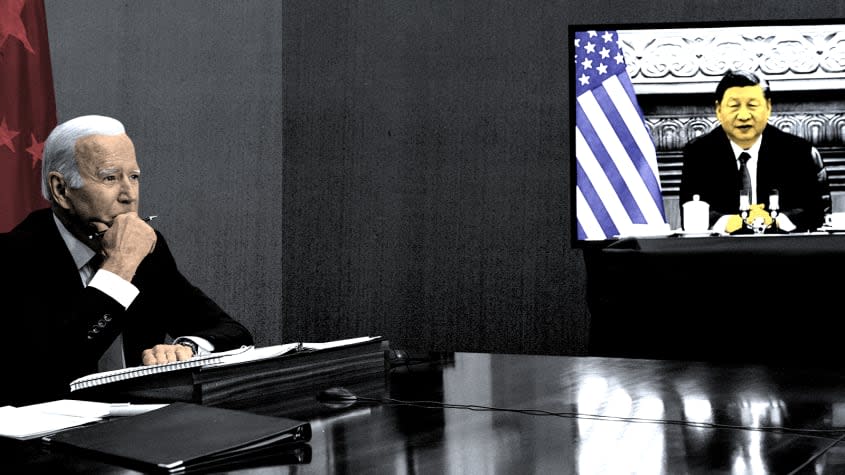Biden's promise to defend Taiwan

- Oops!Something went wrong.Please try again later.
President Biden said Monday that the U.S. would defend Taiwan if China attacked militarily. "That's the commitment we made," Biden said. Biden reaffirmed the One China policy under which the U.S. formally recognizes only one Chinese government — the one in Beijing — but doesn't accept China's claim over Taiwan as a breakaway province, instead maintaining close unofficial ties to the islands' government. But Biden said "the idea that [Taiwan] can be taken by force, just taken by force, is just not appropriate," particularly as the world rejects Russia's invasion of Ukraine.
China promptly expressed its "strong dissatisfaction and firm opposition" to Biden's remarks, saying he was interfering in China's "internal affairs." The White House tried to smooth things over by saying Biden was merely restating a longstanding commitment under the 1979 Taiwan Relations Act to provide Taiwan with what it needs for self-defense. On Tuesday, Biden said his policy toward Taiwan had not changed, suggesting that Washington's "strategic ambiguity" on how far it would go to protect Taiwan remained in place. Does Biden need to talk tough to discourage China from making a move on Taiwan, or is he escalating tensions unnecessarily?
Biden is right to defend Taiwan
Biden has to stand up more forcefully for Taiwan, says Henry Olsen in The Washington Post. The policy of strategic ambiguity worked fine for a long time, but "Chinese President Xi Jinping's increasingly aggressive behavior" in the Pacific "makes the policy untenable." Taiwan is at a "flashpoint" similar to Ukraine's in Europe, pitting the U.S. against an "autocratic power." If Washington had abandoned Ukraine "in its time of need, our European allies — who recognized the threat a Russian-conquered Ukraine would pose to their security — would question our commitment to them. So it is with Taiwan; if the United States won't defend a longtime, democratic friend, other allies in Asia would call our commitment into question."
Biden is only stoking tensions
The vagueness of the traditional U.S. position on Taiwan "helped deter China from invading Taiwan while also helping deter the self-ruled island from declaring full independence," says David Smith at The Guardian. Biden says he hasn't changed the U.S. policy, but this is the third time he has said the U.S. would come to Taiwan's defense, so this was no "gaffe." Biden clearly isn't comfortable leaving any doubt over the U.S. willingness to defend Taiwan militarily. He apparently wants China to consider Russia's "disastrous" invasion of Ukraine, and see that it would have no "cakewalk" in Taiwan, either, because of "the resolve and unity of the west." But by rocking the boat he's only causing confusion and increasing already high tensions across the Taiwan Strait.
If anything, Biden should be tougher
Knowing the U.S. and its allies would intervene to protect Taiwan "may give Chinese President Xi Jinping some pause about the costs of an invasion," says The Wall Street Journal in an editorial. But defending it would cost us, too. China has built a military capable of overwhelming Taiwan's defenses by air and sea, and blasting U.S. airfields and ships in the region with missiles. Biden's budget will shrink the Navy to 280 ships in 2027 from 298 today, while China's fleet expands. He'll have to spend more for "a credible defense of Taiwan." And Biden blew it by not including Taiwan in the 13-nation Indo-Pacific Economic Framework he announced this week. Excluding Taiwan, an "economic powerhouse," makes "no sense if you're trying to show the U.S. commitment to the region."
You may also like
Trump loses his grip on a Trumpified GOP

